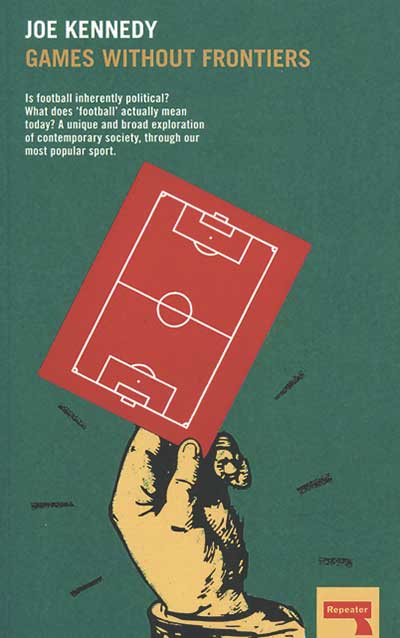
Repeater, £8.99
Reviewed by Dan Howdon
From WSC 367, September 2017
Buy the book
Part-travelogue, part-history, part-critique, Games Without Frontiers hangs a wide-ranging exploration of football on the attendance of the author at four football matches. GWF draws on literature and politics to explore the game as a rich social entity, whose historical development shared that of wider society and the structure of the economy.
The book surveys the development of football through modernity and, most recently, neoliberalism – what the political economist Will Davies calls “the disenchantment of politics by economics”. GWF examines the nature of such disenchantment in football, dealing with its effects through intense tactical and statistical analysis, as well as the social and economic constraints imposed on fans.
The book is not an uncritical restatement of the crudest aspects of #AgainstModernFootball, but an examination of the tensions and contradictions around it. While it would be wrong to draw a link between the two, Kennedy reminds us that football’s past against which modern football is contrasted involved not only affordable ticket prices at its top level, but also bananas thrown against black footballers, and more lamentable attitudes towards women even than those that currently often exist.
GWF is perhaps strongest on the overidentification that followers of certain clubs have developed with their teams. The specific example of local residents around Anfield being, to take a generous view, heavily induced to move out of their local communities in order to satisfy the expansionary needs of Liverpool FC to be able to compete with the biggest clubs in Europe, and the lack of outcry for such a move among most fans, is heartbreaking – Kennedy cannily situates the specifics of this within an environment where it is demanded that football fans display their loyalty by, and where they are judged according to, their commercial commitment to the club.
Prospective readers should not be put off by the book’s at times theoretical nature, which helps to illuminate the author’s argument. Most will be familiar with the feeling, explored via the combination of Fyodor Dostoevsky and Roy Keane, that any success enjoyed as a fan is forever contingent and fragile. GWF is funny in parts, with a glorious section skewering the lamentable “what if archaeology was covered like football?” meme, an analysis of a YouTube video involving Turkish canine pitch invaders, and an evocative account of a hangover in a Cumbrian clubhouse being three of my favourite passages.
Ultimately, one of the author’s comments on the most tiresome of advocates of statistical analysis – that reading their work, one could be forgiven for imagining “nobody had ever sung a song, waved a banner… laughed or cried at a football stadium” – captures what is possibly the crux of the book. Football is not just the events that happen on a rectangular piece of grass, but involves sets of individuals, behaviours and institutions that exist within and interact within a broader social and political context.
More than anything, GWF is a rich exploration of football in its broadest sense – not as merely a set of match results, statistics and tactical approaches but as a living social entity. As the author himself remarks: without the colour this brings, there would be virtually nothing worthwhile to say.